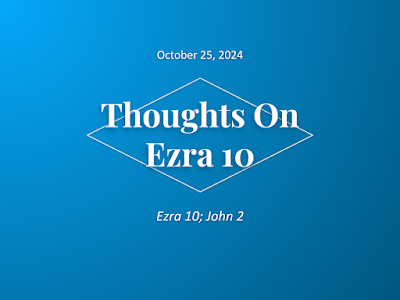Today’s reading: Ezra 10; John 2
I know it’s not the main point of the chapter, but what stood out to me in Ezra 10 this morning was the disagreement of Jonathan and Jahzeiah with the rest of the elders and heads of houses.
When everyone is gathered to deal with the problem of so many people having married foreign women, because they will need to deal with so many people, and because of the heavy rains, they decide to send everyone home and have people come back, city by city, at appointed times. We are told that only Jonathan and Jahzeiah opposed the plan of sending everyone away, seemingly preferring to just take care of the matter right then and there, despite the conditions.
On the one hand, I’m betting that Jonathan and Jahzeiah felt like it was a further betrayal of Yahweh to let this sin continue in Israel when they had the chance to deal with it right away. Their desire was good and godly. On the other hand, the other elders are looking at it practically and functionally and seeing that, while it would be good to deal with it sooner than later, they are dealing with real people that need taken care of, who have children with them and probably farms and such they need to get back to take care of, etc., and so they are looking at how to deal with the sin while also caring for the people. Their desire was good and godly as well. Neither group was clearly “more right” in how this should be dealt with, so they went with the majority.
That can be a difficult position to be in. I’ve personally been in that position before, where the group I was helping to lead a home church with was largely unified in one direction, but I felt very strongly that the Lord was making it clear we should go in a different direction. Trying, in that moment, to be okay with going with the majority, against what I thought God would have, was very difficult.
There are a couple examples I have heard from the early church though that have personally been helpful in handling these moments. The main one that came to mind as I was reading this morning was Origen and the book of Enoch. If you’re not familiar with it, the book of Enoch is a Jewish text out of the second temple period. The Jews regarded it highly but didn’t consider it Scriptural, at least in part because there were no copies of it in Hebrew. But then, in the largely non-Jewish early church, where almost none of the early church fathers could read Hebrew anyway, the question of whether or not they should include Enoch in the bible resurfaced. Origen felt strongly that it should be considered canonical and argued for it for many years. Eventually though, he abandoned his position and decided it shouldn’t be in the bible. His change of heart on the matter had nothing to do with new information or convincing arguments, but with the fact that the vast majority of the church wasn’t persuaded. He decided that, with the Holy Spirit involved, if Enoch should be in the bible, people would have been persuaded, but since they were instead unified to the opposite point of view, that must be the Holy Spirit and he should accept that testimony.
I appreciate that example of humility and feel like it applies to Ezra 10 as well. As right as Jonathan and Jahzeiah were to want to see God glorified and the sin dealt with immediately, the reality was that there were others there too, like Ezra himself, just as zealous for the glory of God, but who stood on the opposite side of the issue. And while the majority of people wanting or believing something doesn’t necessarily make it good or right, when the group in question is all seeking to be faithful to the Lord, and the Holy Spirit is involved, it’s a pretty safe bet that God is not letting His people unwittingly run astray as they seek to be faithful to Him.


No comments:
Post a Comment